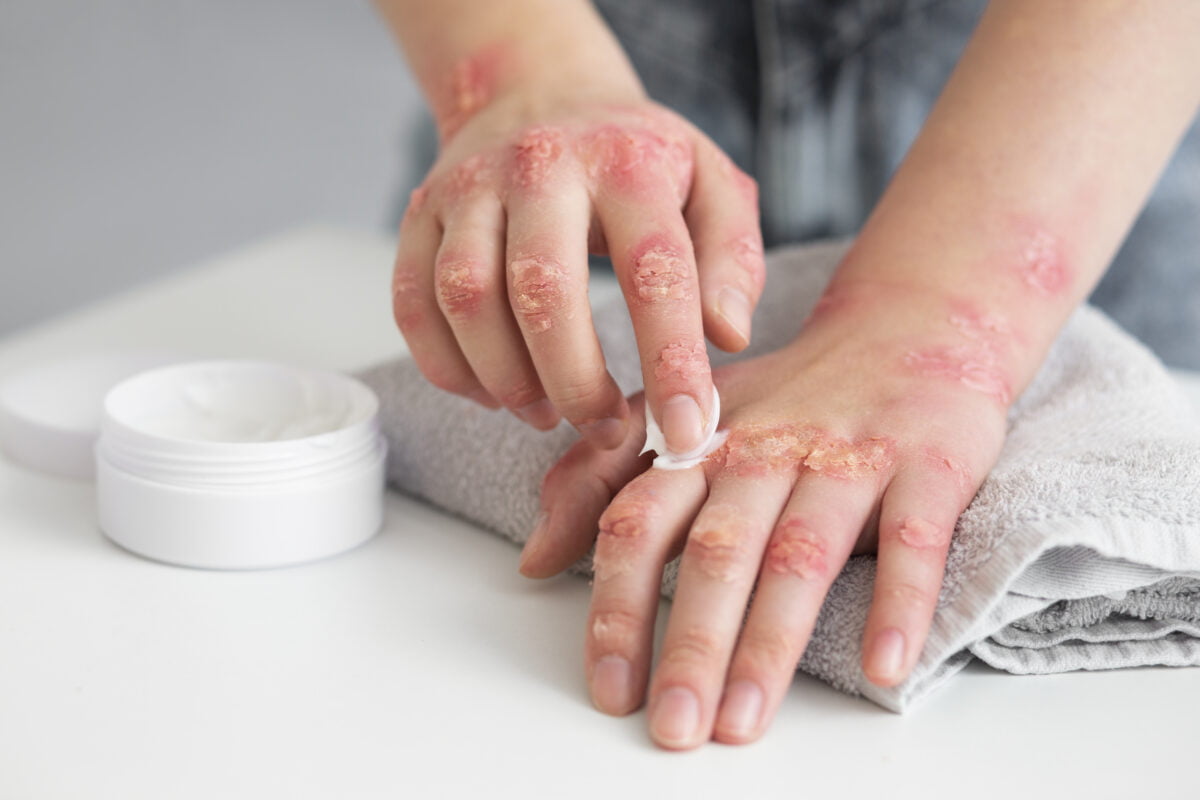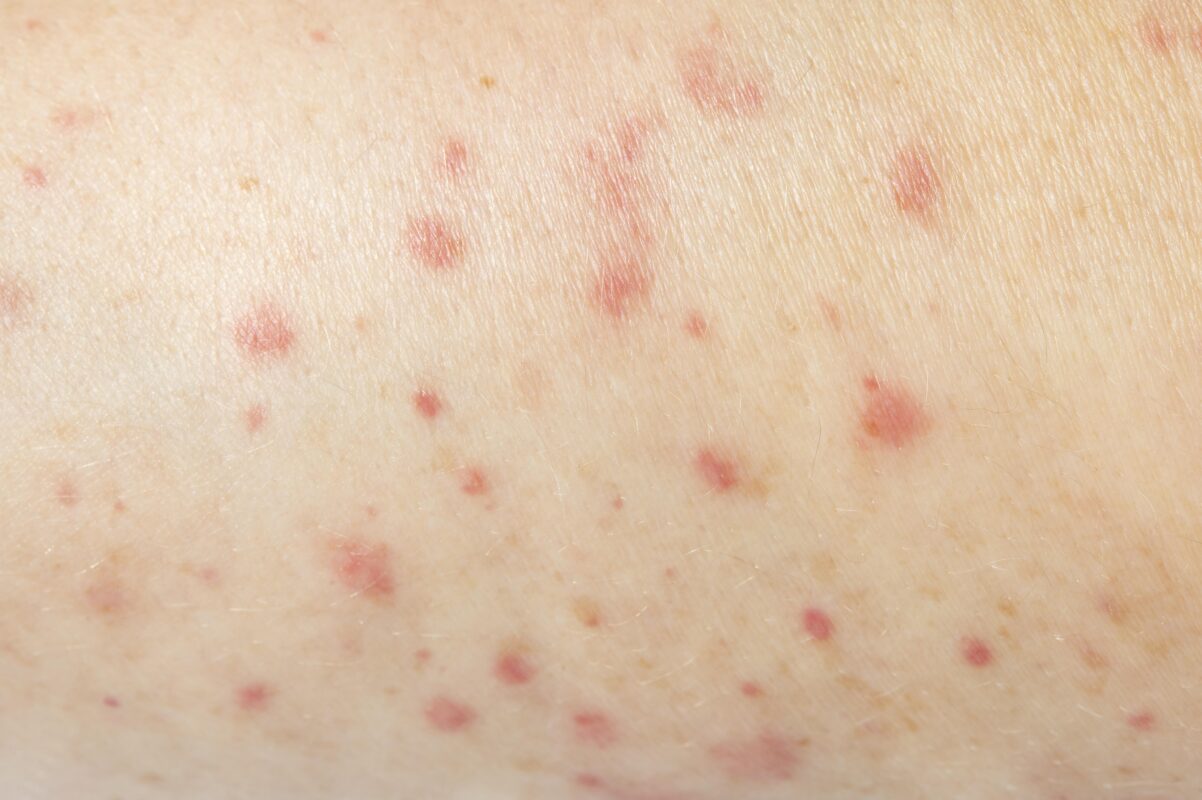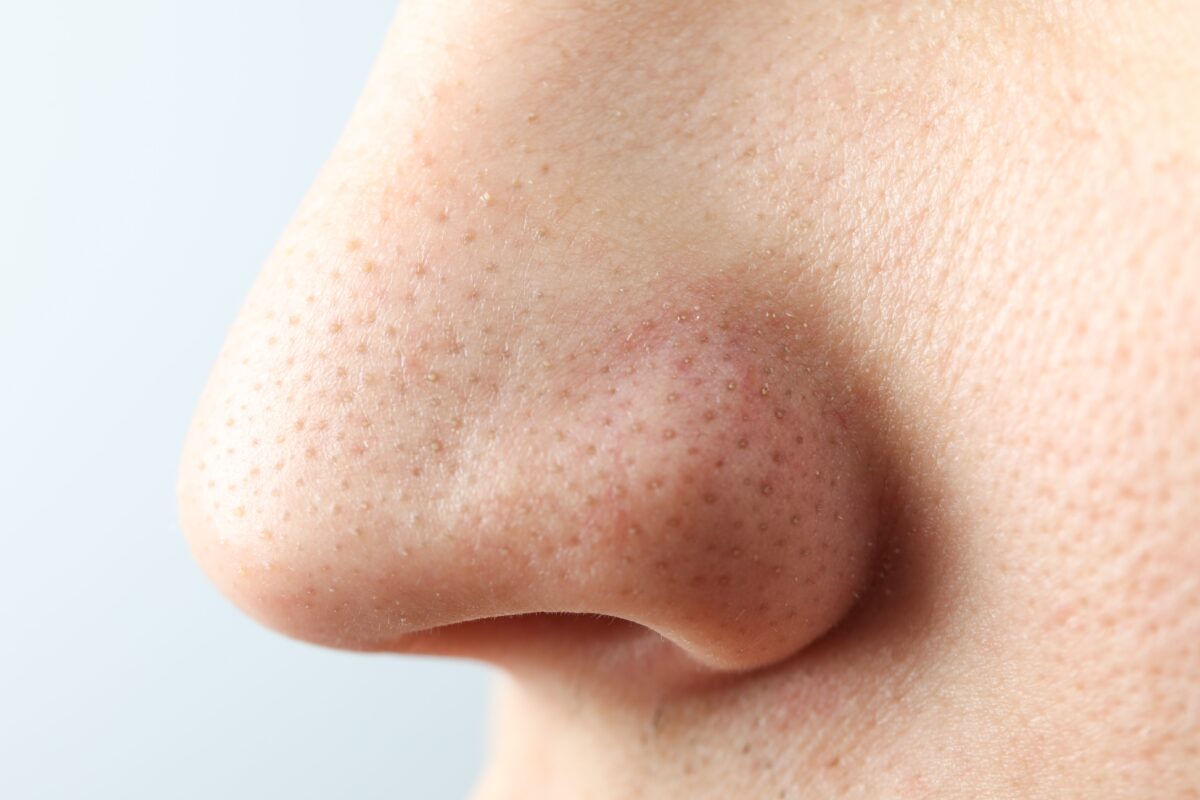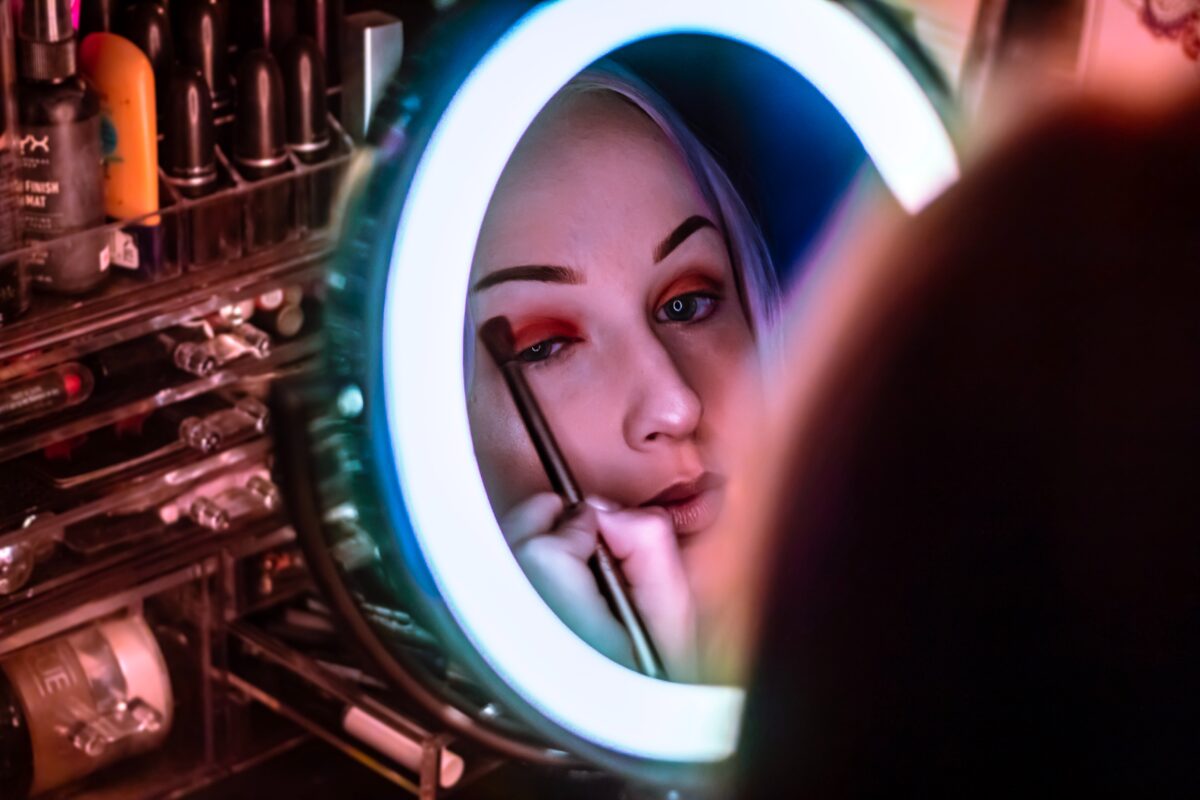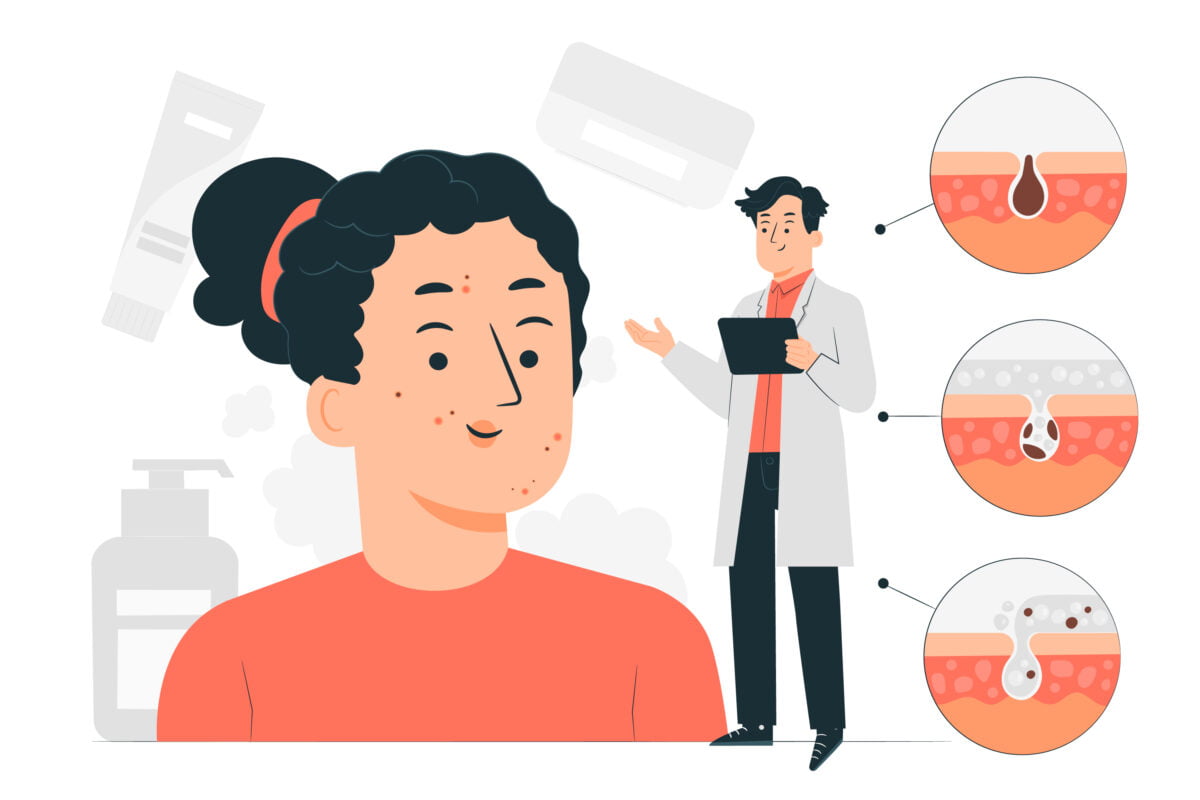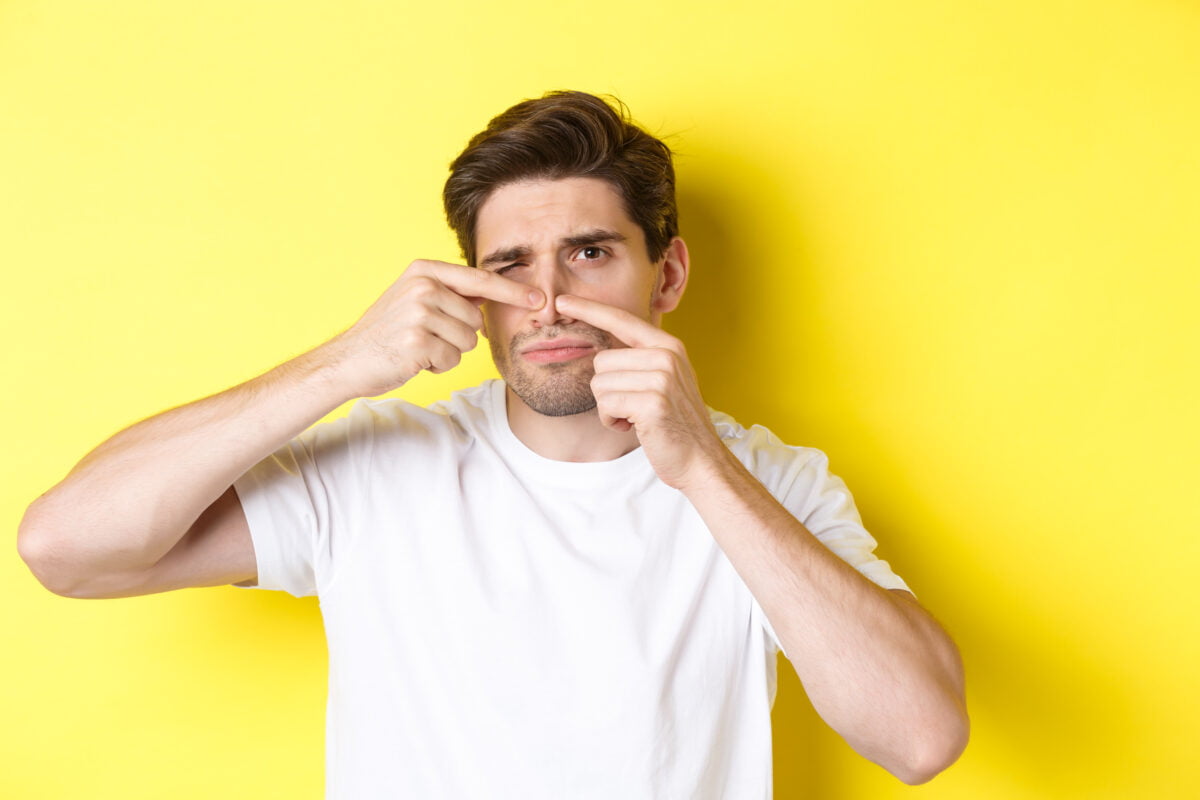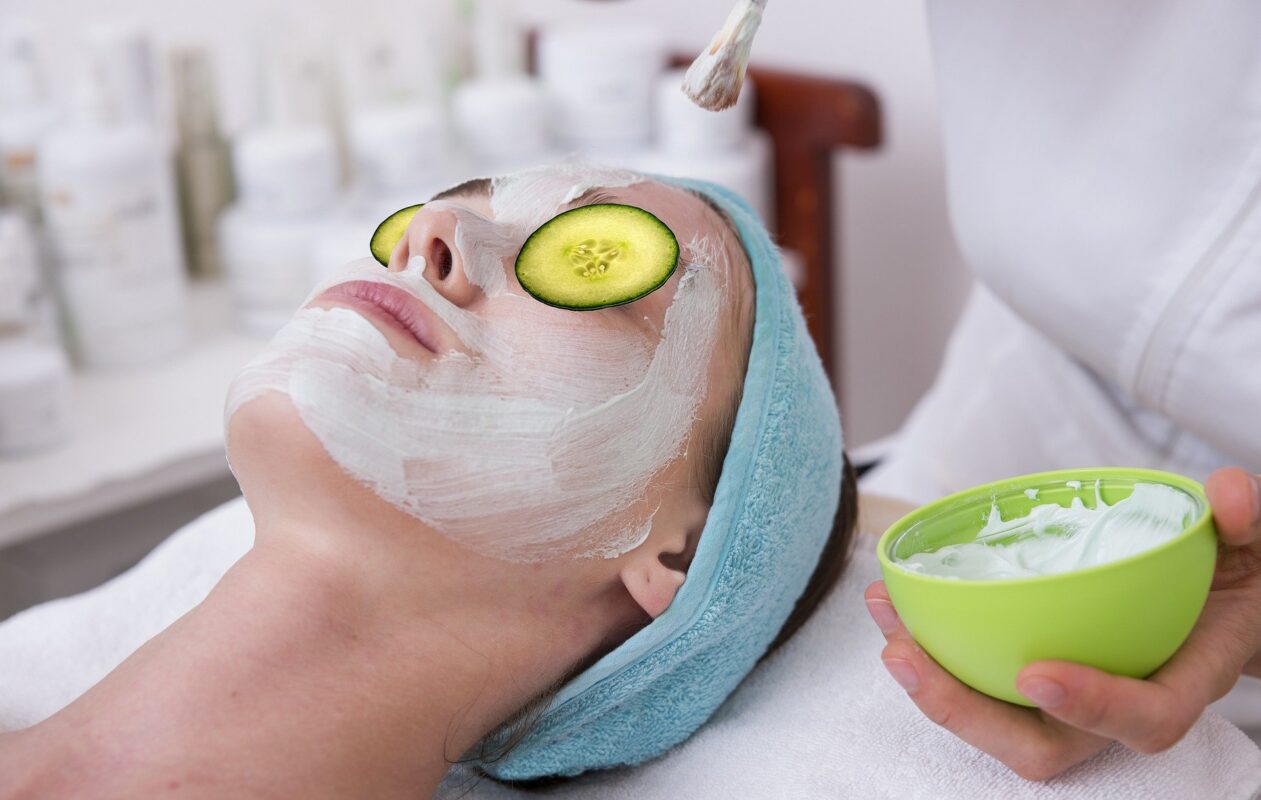Over 7.5 million adults in America are diagnosed with psoriasis. It’s an autoimmune disease that affects a person’s skin and appears as red, violet, or pink patches with silver, gray, or white scales. The soreness and throbbing pain these red patches cause make the affected person wonder if there is any cure for this skin disorder. Let’s have a look at the possible treatments and ways that can help ease the symptoms of psoriasis. Can Psoriasis be Cured? Though no proper cure for psoriasis exists, there are several ways to help the psoriasis patient feel better and manage severe flare-ups. You can take topical treatments, phytotherapy, and home precautions to eliminate psoriasis symptoms completely. Topical Treatment for Psoriasis Salicylic Acid Using shampoos and scalp solutions containing salicylic acid can diminish the scaling of scalp psoriasis. You can use it alone, or for better effect, combine it with other medications so it easily penetrates in the skin. Calcipotriol Calcipotriol or calcipotriene is a powerful synthetic vitamin D that controls the overactive cells of the skin. Some physicians may pair it with steroid creams. Phototherapy In phototherapy, a person’s skin is exposed to ultraviolet light by an expert. These rays can slow down the growth of skin cells causing psoriasis. You need to take consistent and frequent sessions of this therapy. You can also try sitting in the sun for a few minutes to reduce plaques. However, excessive exposure to the sun is not a good idea as it can increase the chances of skin cancer in some patients. Psoriasis Treatment at Home Soak Your Body Taking a lukewarm bath with olive oil, Epsom salt, or milk can soothe the itchiness and those creepy scales and plaques. Oatmeal baths are very effective for soothing plaque psoriasis symptoms. Do not use hot water as it may cause more irritation. Moisturize your body immediately after taking a bath to avoid it getting dry. Try putting a humidifier in your office or home to moisten the air. Quitting Smoking Smokers are at more risk of getting psoriasis or if one already has it, smoking will make the symptoms worse. So, stop smoking to soothe the symptoms. Avoid Alcohol Alcohol is the culprit for causing psoriasis in many. Research shows that women who drink beer have increased chances of getting psoriasis than those who don’t. Take Dietary Supplements As psoriasis occurs due to the dysfunctionality of the immune system, treating it externally alone won’t help. Try consuming dietary supplements to treat psoriasis symptoms internally. Taking diets containing Fish oil and vitamin D are reported to aid mild psoriasis symptoms. Diamond Glow is a blend of 15 natural active ingredients, including vitamin A, B, C, and E. Consuming this supplement may help reduce the symptoms of psoriasis. However, always consult your doctor before taking any supplements to ensure they don’t affect your condition negatively. Take Away Autoimmune skin diseases like psoriasis come and go throughout the patient’s life. Although there is no proper cure for psoriasis, certain home remedies and topical treatments can help reduce the symptoms and prevent potential breakouts. Read this guide to learn how you can treat or manage psoriasis to control its spread and reduce pain.
Did you know that more than 3% or 7.5 million US adults have psoriasis? Psoriasis is a chronic inflammatory and immune-mediated skin condition characterized by the appearance of plaques or scales. Its more obvious causes are the hyperactive immune system and genetics. However, some factors may trigger and worsen its signs. Let’s dive deeper into how psoriasis is caused. What is Psoriasis? Psoriasis is an autoimmune disease caused by the overproduction of skin cells, leading to inflammation and a scaly, patchy appearance. In psoriasis, the body can’t get rid of old dead skin cells, thus they keep on accumulating on the skin in the form of dry and extremely sensitive areas. How Psoriasis is Caused? There are multiple reasons behind psoriasis, the most obvious ones being: Genetics Genetic factors may play a huge role in developing the signs of psoriasis. Around 1 in 3 people who have psoriasis have genetic reasons, and about 10% of the population inherits genes but not all of them cause psoriasis. The genetics of psoriasis are diverse. You can have psoriasis even if you don’t have a family history of the condition. In genetic psoriasis, the genes controlling the immune system signaling become distorted, causing inflammation and hyperactivity in skin cells which leads to enhanced cell production. Immune System Disorder A hyperactive and imbalanced immune system is a major reason behind developing psoriasis. When the immune system disrupts its functioning, the skin cells behave abnormally such as overproduction of cells and inflammation. Moreover, the changes in immune system functioning may lead to flawed signaling in the overall body, causing skin rash, plaques, or skin lesions, such as psoriasis, eczema, and other skin-related diseases. Research suggests that inflammatory mechanisms in psoriasis are largely due to an over-active and defective immune system that contributes to increasing the signs and their severity. What Triggers the Signs of Psoriasis? Weather Usually, the winter and fall seasons are really bad for psoriasis patients. Cold weather, high humidity, low sunlight, and dry air can flare up its signs. Conversely, warm weather may help alleviate psoriasis symptoms. Medication You should always consult your doctor before using any medication while suffering from psoriasis. Sometimes, even a routine medicine may trigger the severity of the disease. Infection or Allergens The immune system in psoriasis becomes compromised, resulting in sending and receiving the wrong signals when in contact with an allergen. Thus, the skin suffers from inflammatory skin disorders. Stress One of the most prevalent psoriasis triggers is stress. Relaxation exercises and stress management techniques may help prevent stress-induced psoriasis. Injured Skin Psoriasis is more likely to develop in skin that has been injured or harmed. For example, skin areas with scratches, sun damage, or bug bites are more prone to developing psoriasis. Bottom Line Psoriasis can’t be cured, but it can be managed. Moreover, its symptoms such as itching and irritation can be minimized by consulting with your dermatologist. Taking steps to identify the triggering factors of psoriasis can also help prevent this chronic skin disorder.
Many assume scaly, thick, red patches or psoriasis on the skin contagious and think they might get it from the person or transmit it to others. Some are concerned about if this rash spreads onto other body parts of the body. Let’s find the answer. Does Psoriasis Spread? Psoriasis is a common skin condition, however, it isn’t contagious. That means you can’t get it from another person or transfer it to them. However, Psoriasis can spread from one body part to another, but it does not spread by touching the infected part. This itchy rash can increase in size or spread on your skin because of an immune system problem. How Psoriasis Spread? As we mentioned earlier, psoriasis doesn’t spread from one individual to another but can spread to different areas of the body. Psoriasis is an autoimmune disease in which an immune system attacks the body’s skin cells, causing them to grow and die too fast and resulting in inflamed rashes on the skin. If you see a new patch appearing at a different location on your body, it’s not because you touched your elbow to the plaque on your arm. It means your immune system dysfunction is in high gear. How Psoriasis Appear on Your Body? Psoriasis can appear in various forms on your body, depending on different types. Guttate psoriasis ﹘ These small pink scaly patches spread quickly along the legs, arms, and torso. Some people also develop these bumps on the face and scalp. Plaque psoriasis ﹘ In this type, scaly, raised rashes develop everywhere on your body’s skin, mostly on the scalp, elbows, and knees. Inverse psoriasis ﹘ These red patches crop up in the body’s folds such as buts, groin, and armpits. Erythrodermic psoriasis ﹘ This is the most severe psoriasis type in which bright red patches, looking similar to burns, grow over the whole body. A person who gets erythrodermic psoriasis can face uncontrollable shivering and ankle swelling. This type is quite rare but can be fatal. What Can Trigger a Psoriasis Flare-up? Research suggests that psoriasis can happen to anybody, even if you have no family history of this autoimmune disease. However, psoriasis often occurs due to genetic and environmental triggers. Here are some common triggers that can cause psoriasis: Smoking Stress Dry air (it could be due to weather or from the heater) Deficiency of vitamin D Certain medications, such as medicines for high blood pressure or malaria Consumption of alcohol Skin injuries like a bug bite, cut, or sunburn Obesity Body infections like strep throat Take Away We have briefly discussed when and how psoriasis spread and on which body parts does it spread. Psoriasis is a non-contagious autoimmune disease that can only spread from one body part to another but can not transmit from one person to another. However, it can become bigger and spread all over the body due to possible triggers.
Blackheads are the most frequent but non-contagious form of acne caused by the clogging of skin pores due to toxins, bacteria, dead skin cells, or dust. According to a 2019 survey, about 67% of people had blackheads and whiteheads as their primary skin problems. Without a proper skincare routine, blackheads appear on the specific skin area no matter how you remove them. So, the best thing is to prevent them from developing either by regular skincare or using OTC medications. Below is a list of the 5 best ways to get rid of blackheads fast. Keep reading! Easy Ways to Get Rid of Blackheads Use Non-comedogenic Products Non-comedogenic products refer to skincare items that wouldn’t cause acne and clog pores. Using non-comedogenic cleansers, face masks, or exfoliants is essential for treating your major skin problems, including acne, blackheads, and whiteheads. Always read the list of ingredients carefully before buying any skin product because some comedogenic products might trigger acne and blackheads formation. Perform Regular Cleansing Make sure to regularly cleanse your face to treat and prevent blackheads. Salicylic acid is a perfect ingredient for treating blackheads. It opens the clogged pores by breaking the dead skin cells or toxins that cause blackheads. However, sensitive skin may get irritated by salicylic acid, so always consult your dermatologist before trying any skin product. Do Gentle Exfoliation Exfoliation may negatively impact acne-prone skin; however, you need gentle exfoliation to get rid of blackheads. Exfoliants containing alpha and beta hydroxy acids are considered effective for removing blackheads. Glycolic acid and salicylic acid are the best forms of exfoliants you must try for blackheads treatment. AHAs and BHAs are also safe for all skin types. Avoid harsh chemicals or alcohol-containing products as they can induce or enhance skin sensitivity. Apply Clay Masks Clay masks are usually suggested for oily skin. They help in unclogging pores by extracting oils and impurities out of the skin. Moreover, they can also help to reverse aging signs and get refreshing skin. Sulfur-containing clay masks help break down the dead skin that may cause blackheads. You can choose a mask and use it once a week, depending on your skin type. Oil-free Sunscreen Applying sunscreen is mandatory for all skin types, whether oily, sensitive, dry, or acne-prone skin. It helps protect the skin from harmful UV rays of the sun, thus delaying aging signs and reducing the risk of skin disorders. However, choosing the right product is the magic for getting glowing, healthy skin. You must read the label and select the good quality oil-free sunscreen as it can prevent the clogging of skin pores due to excessive oil. Multivitamins Taking vitamin-rich foods and supplements can aid in protecting your skin against pesky black spots. Vitamins can help regulate your hormones, prevent and combat acne or blackheads, and boost your skin health. You can consume the Diamond Glow supplement having multiple advantages for your skin and overall health. It is enriched with vitamins, minerals, and fruit extracts to help treat and prevent scars, pigmentation, and acne and maintain the skin’s natural oils. Click to learn more about Diamond Glow.
Preparing combination skin for makeup can be tricky as choosing the wrong products may cause a patchy makeup look. You need to develop a skincare routine before makeup to control excess sebum and hydrate the dry parts, thus achieving a balanced skin texture. In this article, we’ve compiled expert beauty tips to help you get a flawless makeup look for combination skin. Keep reading to know how to prepare combination skin for makeup! What is a Combination Skin Type Skin with a blend of areas having extreme oiliness and dryness simultaneously represents the combination skin. Usually, the T-zone is oily and the cheeks are dull and flaky. However, T-zone skin texture varies with a change in weather, such as oily in summer and normal in winter. How to Prepare Combination Skin for Makeup Below are a few expert tips to prepare your combination skin for makeup. Deep Cleanse Your Face Cleansing is a prime requirement before applying makeup to your skin. It purifies the skin and unclogs skin pores by removing all the dirt or toxins. Ensure to use gentle cleansers to give it a well hydrated and smooth texture. Water-soluble cleansers with a good content of antioxidants and having a gel consistency are best for combination skin. Avoid using cleansers with soap and foaming formulas as it might irritate combination skin. Try gel or cream cleansers packed with mild ingredients for an even and smooth appearance. Moisturize Moisturization rejuvenates the skin by maintaining the skin’s natural hydration. Focus on ingredients before buying moisturizer for combination skin. The moisturizer should contain elements that moisturize the dry patches and control extra sebum in skin pores. Hyaluronic acid is a fantastic ingredient for moisturizing combination skin as it deals with the dull skin texture and refreshes it. It also helps retain the natural skin moisture without causing excess oiliness in oily parts. Moreover, hyaluronic acid has anti-aging properties that help combat aging signs. Apply Toner Toner helps balance skin pH, thus maintaining normal skin hydration. A good quality toner should contain skin-nourishing ingredients and antioxidants that can soothe the skin. Ensure using alcohol-free toner for combination skin as alcohol may aggravate the skin inflammation and sensitivity. Moreover, it also improves the absorption of different skincare products. Take a tiny amount of toner in your hand and gently apply it all over your face and neck. It will smoothen your skin texture by controlling the skin’s oiliness. Apply Sunscreen Sunscreen is essential for a healthy skincare routine, either for dry, oily, or combination skin types. Applying sunscreen with SPF30 or above acts as a protective shield around the skin and helps minimize sun damage. Moreover, it improves the antioxidant defense mechanism of the skin against free radical damage. Apply Primer Priming your skin helps vanish fine lines and blemishes by managing uneven skin texture. It also helps minimize skin pores, smoothen fine lines, and improve skin quality in combination skin types. Apply a small quantity of primer to different positions and blend with soft hands on targeted areas. Bottom Line If you have a combination skin type, use products suitable for controlling excess sebum on oily skin parts and dehydration on dry regions. Follow the tips and steps mentioned in this article to achieve visible effects for a fine makeup look.
Clogged skin pores due to the deposition of excessive oil, toxins, dust, or dead skin cells are the leading causes of blackheads. Though blackheads do not pose any serious harm to your skin or health, leaving them untreated may lead to deep or huge blackheads and a few other skin conditions. Keep reading to know what happens if you don’t remove blackheads. What Happens if You Don’t Remove Blackheads? Not removing blackheads can lead to various other skin conditions, including: Can Cause Acne Blackheads are the types of acne that may form due to the clogging of hair follicles. Minor blackheads may be harmless to skin health. However, if they persist for longer, it might cause various infections and inflammation. Moreover, they may also stimulate acne lesions, causing pimples, cysts, bumps, or other skin disorders. Can Develop Scars Blackheads can cause skin diseases, blemishes, and discomfort if left untreated. They might also leave lasting acne scars that are sometimes difficult to remove with topical treatments. In this case, your doctor may suggest different treatment choices such as laser therapy to safely remove blackheads and lessen scars. Can Lead to Hyperpigmentation Hyperpigmentation is a skin condition characterized by dark spots due to the overproduction of melanin– the pigment responsible for specific skin color, hair, and nails. Sun exposure, aging, trauma, and blackheads can all cause hyperpigmentation. If you don’t get rid of blackheads, they may become more pigmented, thus appearing darker than before. Can Form Deep or Huge Blackheads As long as blackheads remain present, their chances of penetrating deep inside the skin cells increase. Moreover, the constant build-up of dirt, toxins, or dead cells can also cause the formation of huge blackheads. The deeper and huge the blackhead, the more difficult it is to remove them, causing long-lasting skin problems. How to Safely Remove Blackheads? There are multiple ways to remove blackheads but all of them need proper care to avoid skin irritation or infection. Usually, popping blackheads without precautions may result in severe skin infections. Moreover, improper sterilization of tools used in the procedure may also increase the risk factor of skin infections after removing blackheads. We’d recommend seeking treatment from your beautician or dermatologist for the best results without causing any skin damage. Effective Ways to Remove Blackheads Removing blackheads demands a lot of care and sterilization. You can opt for home treatments, but it’s good to go for medical treatment for more reliable results. Some of the most effective ways of treating blackheads are: Steam to soften clogged pores filled with debris, thus helping break down deposited waste in pores with more ease Exfoliate with a mild scrub having alpha and beta hydroxy acids to safely remove blackheads. Ensure gentle scrubbing as harsh treatment can worsen the problem Cleanse using cleansers that contain glycolic acid and salicylic acid because they act as humectants that help retain natural skin moisture Go for professional extraction such as dermabrasion and chemical peels Bottom Line There are various risks associated with not eliminating blackheads, including skin infections, acne outbreaks, and hyperpigmentation. Make sure to remove blackheads and maintain a proper skincare routine to keep them from coming back. You may also consider taking Diamond Glow, a multivitamin that contains vitamin A, B, C, and E and other natural ingredients to help heal various skin conditions, including blackheads, whiteheads, wrinkles, acne, pigmentation so you get more glowing and clear skin.
Blackheads are a common skin condition that mostly appears on the face and nose. People often assume that blackheads appear due to the accumulation of dirt on the skin, but that’s partly true! They actually develop when your pores get clogged due to excess oil and dead skin cells. Because blackheads are quite annoying, many people often try reckless methods to get rid of them, including popping or squeezing. However, that’s not good practice and can worsen the symptoms. Today, we are here to tell you foolproof ways to remove blackheads and prevent them from coming back. How to Remove Blackheads and Prevent Them Cleanse Your Face Using cleansers containing salicylic acid is ideal for treating blackheads. Salicylic acid not only unclogs pores and removes dead skin cells by seeping deep into the skin but also cleanses excess oil, dirt, and makeup. This way, it helps prevent and remove blackheads. Use Oil-free Sunscreen Daily Wearing oily sunscreen on the skin breaking out may sound weird as blackheads are caused by excess oil. However, wearing sunscreen is essential no matter what type of skin you have — dry, oily, or sensitive. Go for any good quality oil-free sunscreen that will effectively protect your skin from UVA and UVB rays. You can also use moisture with SPF to keep skin hydrated. It forms a thin layer over the skin that protects the pores from becoming enlarged because of sun exposure, thus keeping blackheads at bay. Apply Face Mask Weekly Face masks are quite effective for removing blackheads. They work as a vacuum cleaner for the skin and suck all the excess dirt and toxin from the depth of the pores. Because a face mask does intense cleansing, it will be enough to use it only once a week. Many good face mask cleansers are available on the market that can help prevent the skin from clogged pores and thus future blackheads. Apply the mask on your face for 10 to 15 minutes until it gets dried, showing all the excess oil has been absorbed. Intake of Vitamins Don’t fight the blackheads by external means only. Intake of a vitamin-rich diet, drinks, or supplements can also help you wage war against those tiny black spots. Vitamins can help balance your hormonal levels, fight acne or blackheads, and may lead to clearer skin. You can try sipping on Diamond Glow, a powdered supplement with many skins and health benefits. This product can help reduce scars, remove pigmentation, treat acne, control oil, and keep your skin moisturized. Additional Tips To Prevent Blackheads from Coming Back Wash the face when you wake up, before bed, and when you sweat. Use non-abrasive cleansers gently on your skin; use fingertips for application. Rubbing with washcloths or sponges may irritate the skin. Use alcohol-free products. If you have oily hairs, then shampoo them regularly. Avoid touching your face too much. Don’t sleep while wearing makeup on your face. Wash all the makeup before going to bed. Bottom Line Although blackheads on the skin can be frustrating at times, this is usually a temporary and harmless skin condition. You can easily get rid of them by simply making a few changes in your skincare routine. Follow the steps we have mentioned above to remove blackheads and prevent them from coming back.
Approximately 85% of Americans experience acne at some age in their life. Whiteheads are a form of acne that is very common, especially in teenagers and adults, and can be frustrating at times. However, it’s never too late to prevent or remove whiteheads with the help of home remedies, certain products, or medical treatment. But before using anything, it’s important to know the causes of whiteheads. So let’s get into this. Causes of Whiteheads To effectively treat the whiteheads, it is essential to know what causes them to prevent future breakouts. Whiteheads mainly occur due to clogged pores that can happen due to several reasons, including; Hormonal changes are one of the common triggers for acne. Your skin pores produce different amounts of oil or sebum at different life stages such as puberty, menstruation, and pregnancy. Hormonal imbalance can cause increased sebum production which leads to clogged pores and whiteheads. Sometimes acne is in your genes. Genetics plays an important role in developing different acne types, including whiteheads. If any of your family members suffer from acne, you have a higher risk of having it. An increased amount of bacteria or oil on your skin blocks the pores, thus leading to whiteheads. Where Do Whiteheads Occur A whitehead usually develops on the nose, chin, and forehead, also known as the T-zone. However, you may also develop whiteheads on your back, chest, shoulders, and arms. Treatment for Whiteheads Honey Raw honey can be helpful for treating various acne problems. Its anti-inflammatory, antimicrobial, and antioxidant properties may help reduce acne redness and kill and prevent the bacteria that cause acne. Using honey may also help heal wounds due to broken whiteheads as natural enzymes in raw honey form hydrogen peroxide that prevents bacteria from thriving. Intake of Vitamins Vitamins A, C, and E are essential for healthy and clear skin and can help remove whiteheads. The antioxidant properties of Vitamin A and vitamin C protect skin from free radical attacks that lead to acne breakouts. Vitamin E quickly absorbs into skin, thus keeping skin moisturized and promoting collagen production. You can include food or supplements containing these vitamins in your diet routine to get clearer skin. Diamond Glow is one such supplement that contains all these vitamins. It also contains other active ingredients in its formulation that not only help restore collagen and control oil but also treat acne, reduce scars, and boost energy. Salicylic acid Salicylic acid is an astringent found in many skin products used for acne. Salicylic acid fight against whiteheads in various ways, such as: Reducing oil production Helping remove dead skin cells Bringing the bacteria and dirt clogged in the pore on the skin’s surface Absorbing excess oil on the skin, thus making your skin less oily Bottom Line Whiteheads are an acne type that appears as a yellowish or white bump on the skin. It can be pretty frustrating and uncomfortable for many. However, you can deal with the whiteheads once you know the root cause of them. For example, it could be due to genetic, hormonal issues, or the accumulation of bacteria or oil on your skin. Read the above guide to know the reason for your whiteheads and treat accordingly.
Like any other skin type, combination skin also demands proper cleansing, moisturizing, and protection to help achieve well-nourished, smooth, and glowing skin. However, maintaining a proper skincare routine for combination skin can be challenging at times. You want to balance moisture in dry and oily parts of your skin without losing necessary natural skin oil. This article shares a skincare routine guide for people with combination skin. Let’s start! Morning Skincare Routine for Combination Skin Cleanse with a Foaming Gel Cleanser Using a gel cleanser helps remove excess oil on combination skin. Its gentle exfoliation formula balances skin texture and develops a protective sheath around it. Salicylic acid, niacinamide, and hyaluronic acid are excellent ingredients for a youthful skin tone in combination skin types. Apply Toner Toner is perfect for balancing skin pH by removing any excess oil left after cleansing. Make sure to use alcohol-free toner because it might cause irritation or burning sensation for sensitive skin or combination skin otherwise. Moisturize A good quality serum can fulfill the demands of skin moisturization by effectively hydrating the skin and protecting it from the patchy texture caused by extreme dryness. People with combination skin need two moisturizers for their skin, i.e., creamy or gel formula for dry skin and water-based formula for oily skin areas. Apply Sunscreen Sun protection is essential for all skin types in your skincare routine. The best sunscreen should be broad spectrum with SPF 30 or above, protecting against UVA and UVB sun rays. Apply a small quantity to different points on skin exposed to sunlight and pat the area for absorption. You must apply sunscreen every time you go out or even every 2-3 hours of sun exposure. Night Skincare Routine for Combination Skin Remove Makeup Clearing skin pores from makeup and keeping them unclogged is necessary for nourished skin. Make sure to remove all the makeup before going to bed because any leftover product may cause a rough and dull appearance. You can use any mild cleansers or natural skin products for this purpose. Cleanse After removing makeup products, you need to apply a gentle cleanser to remove any dirt, bacteria, or makeup remnants. Exfoliate Exfoliation is essential for removing dead skin cells, unclogging skin pores, and protecting from extreme dryness. Typically, the number of exfoliation sessions should not exceed twice a week. Apply Face Mask Go for a multi-tasking face mask once a week to get balanced, well-nourished, and radiant skin. You can also make a DIY facial mask containing natural ingredients. Moisturize Apply a gentle moisturizer or a high-quality serum on dry patches of the skin to get a hydrated texture. Best Ingredients for Combination Skin Hyaluronic acid is an excellent ingredient for combination skin as it hydrates the skin without leaving oily residues. Salicylic acid regulates and balances oil production in the skin. Lactic acid helps clear skin pores by removing dead skin cells. Emollients such as shea butter or coconut oil soften and rejuvenate the skin texture. Bottom Line Following a good skincare routine for combination skin can help revitalize skin by balancing its moisture. Moreover, you can take Peche’s Diamond Glow, a multivitamin supplement enriched with vitamins, minerals, collagen, and antioxidants to boost skin nourishment in all skin types.
Guarana, also known as Paullinia cupana, is a fruit native to the Amazon. For many years, people have used the fruit and its extract for weight loss, improving memory, and relieving chronic diarrhea. Guarana is packed with vitamins, minerals, and antioxidant properties to many health benefits such as improved digestive health and focus. The fruit also contains stimulants such as caffeine that act as an energy booster. Let’s have a look at the top 4 health benefits of guarana. 4 Potential Health Benefits of Guarana Extract 1. Contains Antibacterial Properties One of the excellent qualities of guarana fruit is it can inhibit or kill harmful bacteria such as Escherichia coli (E.coli). Usually, E. Coli is found in human and animal intestines. Although not all of them are harmful, some can cause illness or diarrhea. Guarana is also proven to suppress the growth of Streptococcus mutans, also known as S. mutans. It’s a bacteria responsible for tooth decay. 2. Can Reduce Fatigue and Improve Focus Another superb benefit of guarana extract is that it can help relieve fatigue and boost energy. Guarana seeds contain four to six times more caffeine than coffee beans, which makes them an excellent ingredient to block the effects of adenosine, a compound that causes your brain to relax. Adenosine receptors, when bound to caffeine, become inactive. A study shows that people who take guarana vitamin supplements feel less fatigued as compared to those who do not. Surprisingly, eating guarana can help lower mental fatigue in cancer patients without any significant side effects. 3. May Treat Chronic Diarrhea and Constipation For centuries, guarana has been effectively used to treat digestive issues such as chronic diarrhea and constipation due to its antioxidant properties. The antibacterial effect is due to the combination of plant-based compounds (catechins or tannins) and caffeine. Being an astringent, tannins can bind and contract tissue which allows it to waterproof your digestive tract walls as well as restricts how much water is discharged into your bowels. Moreover, guarana naturally has a high amount of caffeine that may act as a laxative. Caffeine stimulates peristalsis, which activates contractions in your intestine and colon muscles. This process can treat constipation by pushing the content to the rectum. 4. Helps Weight Loss One out of three adults in America is obese. Obesity is not only about being overweight but often comes with many health risks, including high cholesterol levels, high blood pressure, and cancer. Guarana’s caffeine-rich properties can help lose weight and suppress cravings for junk food and snack between meals. That’s because consuming caffeine boosts your metabolism by 3-11% within 24 hours. A faster metabolism at rest will help your body burn more calories. A study also reveals that guarana helps weight loss by suppressing fat cell production and supporting genes that slow it down. However, guaranas’ effect on fat cells needs further research. Bottom Line For many years, guarana has been used by Amazonian tribes for its pain-relieving effect. Guarana is most commonly used for reducing fatigue, improving learning abilities, and boosting energy. A good thing is that you can easily add guarana extract into your routine through supplements. Diamond Glow is one such powder supplement that contains guarana extract, berries extract, grape seed extract, vitamin, and other natural ingredients. It helps boost your energy, relieve muscle pain, and treat many skin conditions like acne, dark spots, wrinkles, and more.

